|
Featured picture tools: |
These featured pictures, as scheduled below, appeared as the picture of the day (POTD) on the English Wikipedia's Main Page in July 2010. Individual sections for each day on this page can be linked to with the day number as the anchor name (e.g. [[Wikipedia:Picture of the day/July 2010#1]] for July 1).
You can add an automatically updating POTD template to your user page using {{Pic of the day}} (version with blurb) or {{POTD}} (version without blurb). For instructions on how to make custom POTD layouts, see Wikipedia:Picture of the day.Purge server cache
July 1
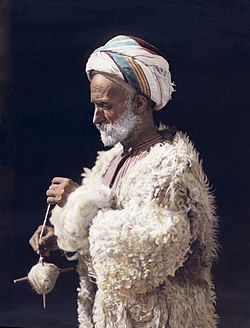
|
A 1919 hand-tinted photograph showing a man from Ramallah spinning wool. Spinning is the act of twisting plant, animal or synthetic fibers into yarn. It is an ancient textile art, with archaeological evidence dating back to the Upper Paleolithic era, some 20,000 years ago. For thousands of years, fiber was spun by hand using simple tools, the spindle and distaff. Only in the High Middle Ages did the spinning wheel increase the output of individual spinners, and mass-production only arose in the 18th century with the beginnings of the Industrial Revolution. In the 20th century, new techniques were invented to produce yarns at rates in excess of 40 metres (130 ft) per second. Hand-spinning remains a popular handicraft. Photo: American Colony; Restoration: Lise Broer
Recently featured:
|
July 2

|
An 1881 editorial cartoon of Charles J. Guiteau, an American lawyer who assassinated President James A. Garfield on July 2, 1881. Guiteau, depicted here holding a note that reads "An office or your life!", believed himself to be largely responsible for Garfield's victory, and demanded an ambassadorship in return, but his requests were rejected. Despite the use of the insanity defense in his trial, he was found guilty and executed by hanging on June 30, 1882. Cartoon: James Wales; Restoration: Jujutacular
Recently featured:
|
July 3

|
A photochrom print of the USS Texas (1892), the first U.S. Navy battleship. The warship was involved in the Battle of Santiago de Cuba on July 3, 1898, the largest naval battle of the Spanish–American War. The Spanish fleet in the Caribbean was destroyed in the engagement, ending any Spanish naval presence in the New World. Photochrom: Detroit Publishing Co.
Recently featured:
|
July 4

|
|
The skyline of Pennsylvania's largest city, Philadelphia. Visible are Center City with the Comcast Center on the left bank of the Schuylkill River and the 30th Street Station with the Cira Centre on the right. Philadelphia was once the largest city in the original 13 American colonies, the location of the signing of the Declaration of Independence, and served as one of the nation's many capitals during the Revolutionary War and after. Photo: Massimo Catarinella
Recently featured:
|
July 5

|
The 'Whirling Butterflies' cultivar of a Gaura lindheimeri plant. Native to southern Louisiana and Texas in the United States, it is a perennial herbaceous plant, commonly grown as an ornamental, that can reach 50–150 cm (20–59 in) tall. It is used in either garden beds or pots for accent colour and delicate texture. It grows best in full sun and can survive lengthy periods of drought. Photo: Noodle snacks
Recently featured:
|
July 6

|
Miomantis paykullii is one of over 2,000 species of mantis found throughout the world. Mantises are related to termites and cockroaches, and are often confused with phasmids (stick/leaf insects) and other elongated insects such as grasshoppers and crickets. Photo: Luc Viatour
Recently featured:
|
July 7

|
An engraving of William Shakespeare's comedy A Midsummer Night's Dream, depicting Titania and Bottom, with fairies in attendance. The play portrays the events surrounding the marriage of Theseus and Hippolyta, both figures of Greek mythology, and the actions of fairies who inhabit the forest in which most of the play is set. It is one of Shakespeare's most popular works for the stage and is still widely performed today. Artist: Henry Fuseli; Engraver: J.P. Simon |
July 8

|
|
St Andrew's Church is the parish church of Alfriston, East Sussex, England. It was built in 1360, and is also known as the 'Cathedral of the South Downs'. Located on the River Cuckmere, it is adjacent to the Alfriston Clergy House, owned by the National Trust. Photo: David Iliff |
July 9

|
A mature specimen of the poisonous Amanita muscaria mushroom. Native throughout the temperate and boreal regions of the Northern Hemisphere, it has been unintentionally introduced to many countries in the Southern Hemisphere and is now a true cosmopolitan species. It is a large white-gilled, white-spotted, usually deep red mushroom, one of the most recognizable and widely encountered in popular culture. Its specific name comes from the Latin musca, meaning "fly", as it was known to be an insecticide when crushed in milk. The mushroom is edible after neutralizing the toxins by parboiling, but Amanita muscaria is now primarily famed for its hallucinogenic properties. Photo: Noodle snacks |
July 10
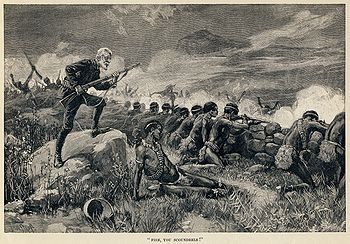
|
H. Rider Haggard's iconic character Allan Quatermain, from Thure de Thulstrup's illustrations to the 1888 novel Maiwa's Revenge, a prequel to Haggard's most famous work, King Solomon's Mines. In this scene, Quatermain orders his troops to discharge their rifles, yelling, "Fire, you scoundrels!" The character served as the basis for the modern Indiana Jones. Restoration: Adam Cuerden |
July 11

|
An 1898 lithographed advertising poster for an American burlesque show. In United States culture, burlesque is a style of live entertainment that encompasses pastiche, parody, and wit. The genre traditionally encompasses a variety of acts such as dancing girls, chanson singers, comedians, mime artists, and striptease artistes, all satirical and with a risqué edge. Although the striptease originated at the Moulin Rouge in 1890s Paris and subsequently became a part of some burlesque across Europe, only in the U.S. is the term burlesque closely associated with the striptease. Lithography: H.C. Miner Litho. Co.; Restoration: Lise Broer
Recently featured:
|
July 12

|
An M777 Light Towed Howitzer in service with the U.S. Army 10th Mountain Division in support of Operation Enduring Freedom in Logar Province, Charkh District, Afghanistan. Manufactured by BAE Systems, it is lighter, has a greater firing range, and requires fewer people to operate than the M198 it replaces. Photo: Jonathan Mallard
Recently featured:
|
July 13

|
Seven players from the 1937 Major League Baseball All-Star Game. The players shown here represented the American League team and every one is a member of the Hall of Fame. Left to right: Lou Gehrig, Joe Cronin, Bill Dickey, Joe DiMaggio, Charlie Gehringer, Jimmie Foxx, and Hank Greenberg. Photo: Harris & Ewing; Restoration: Staxringold
Recently featured:
|
July 14

|
An 1814 engraved cartoon of a double entendre, a figure of speech in which a spoken phrase is devised to be understood in either of two ways. Often the first meaning is straightforward, while the second meaning is less so: often risqué, inappropriate, or ironic. In this cartoon, the man says to the woman, "My sweet honey, I hope you are to be let with the Lodgins!" To this, she replies "No, sir, I am to be let alone." Here, the word "let" can mean either "to leave" or "to rent", so her response can be read to mean either that she wants the man to stop bothering her, or that she is available for a separate fee from the lodging. Artist: Charles Williams; Restoration: Lise Broer
Recently featured:
|
July 15

|
A 1900 illustration of the Norse god Thor with the giant Útgarða-Loki. Giving his name as "Skrymir", the giant tricked Thor and his companions in several ways, such as challenging Thor's servant Þjálfi to a race against Thought, challenging Loki in an eating contest with Wildfire, and challenging Thor to a drinking contest where the drinking horn was connected to the ocean. In the end, Útgarða-Loki revealed his trickery and said that he had been truly afraid at their performance and would never again risk coming near the thunder god. Thor's dealings with giants make up most of the myths surrounding him. Artist: Louis Huard; Restoration: Adam Cuerden
Recently featured:
|
July 16
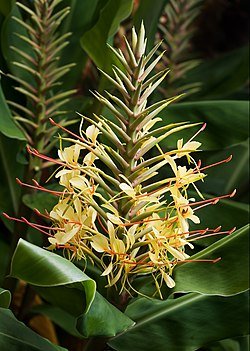
|
The flower of a Hedychium gardnerianum plant, the most widely cultivated Hedychium species. Native to the Himalayas, the plant has spread around the world and has been recognized as one of "The World's 100 Worst Invasive Alien Species" by the IUCN Invasive Species Specialist Group (ISSG). Photo: Noodle snacks
Recently featured:
|
July 17

|
Two Homoneura species flies mating. The genus Homoneura belongs to the subsection Acalyptratae, a diverse collection of fly species that have two traits in common: they lack calypters, and none of them are obligate blood-feeders. The latter is surprising in that this is a life history that is common throughout the remaining Diptera. Photo: Muhammad Mahdi Karim
Recently featured:
|
July 18
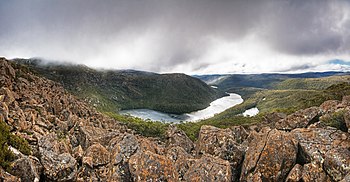
|
Lake Seal in Mount Field National Park, Tasmania. Mt Bridges is visible in the centre, Platypus Tarn in the foreground, and Lake Webster in the background. The Rodway Range and the Tarn Shelf are partially visible on the left. The remains of a cirque glacier are visible in the walls around the lake. Photo: Noodle snacks
Recently featured:
|
July 19
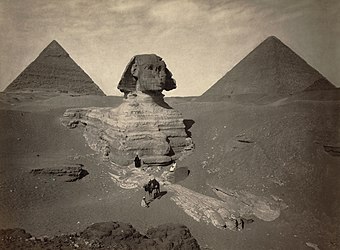
|
A late nineteenth century photo of the partially excavated Great Sphinx of Giza, with the Pyramid of Khafre (left) and the Great Pyramid of Giza (right) behind it. The Sphinx is the oldest known monumental sculpture, and is commonly believed to have been built by ancient Egyptians of the Old Kingdom in the reign of the pharaoh Khafra. Photo: Maison Bonfils; Restoration: Lise Broer
Recently featured:
|
July 20

|
A specimen of Rigidoporus laetus, a fungal plant pathogen. Fungi reproduce both sexually and asexually via the production of spores. These spores may be spread long distances by air or water, or they may be soil-borne. Many soil-borne spores, normally zoospores and capable of living saprotrophically, carry out the first part of their life cycle in the soil. Fungal diseases can be controlled through the use of fungicides in agriculture, but new races of fungi often evolve that are resistant to various fungicides. Photo: Noodle snacks
Recently featured:
|
July 21
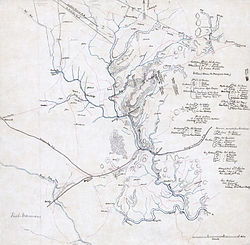
|
A hachure map of Confederate Army positions for the First Battle of Bull Run, the first major battle of the American Civil War, which took place on July 21, 1861. Often called the First Battle of Manassas in the Southern United States, the Union expected to win easily, but their army under Brig. Gen. Irvin McDowell was defeated and forced to retreat. Both sides were sobered by the violence and casualties of the battle, and they realized that the war would likely be much longer and bloodier than they had anticipated. Map: Unknown; Restoration: Lise Broer
Recently featured:
|
July 22

|
The Fulvous Whistling Duck (Dendrocygna bicolor) is a whistling duck which breeds across the world's tropical regions. It is a common species, growing to about 48–53 cm (19–21 in) long. Its habitat is still freshwater lakes, paddy fields or reservoirs with plentiful vegetation, where it feeds mainly at night on seeds and other parts of plants. Photo: Branko Kannenberg
Recently featured:
|
July 23

|
The "Giant Marbles" rock formation in Joshua Tree National Park, located in California, United States. These spherical boulders were formed 100 million years ago from the cooling of magma beneath the surface. Groundwater is responsible for the erosion that created the spheres from rectangular blocks. Photo: Mila Zinkova
Recently featured:
|
July 24

|
A female Thiodina puerpera jumping spider. This species is commonly found in the Eastern United States, its range stretching along the Gulf Coast from Florida to Texas, and north to Kansas, Illinois, and Pennsylvania. Adult females are between 7 and 11 mm (0.28 and 0.43 in) in length and males are smaller. Photo: Kaldari |
July 25

|
An animated image showing the construction of a hypotrochoid (view animation), a roulette curve traced by a point attached to a circle of radius r rolling around the inside of a fixed circle of radius R, where the point is a distance d from the center of the interior circle. The red curve is a hypotrochoid drawn as the smaller black circle rolls around inside the larger blue circle. The Spirograph toy traces out hypotrochoids, as well as epitrochoid curves. Image: Sam Derbyshire
Recently featured:
|
July 26
|
A 1759 map for the British Army plan of attack for the Battle of Ticonderoga during the French and Indian War "proposed to be put in Execution as near as the circumstances and ground will admit of". A British military force of more than 11,000 men under the command of General Sir Jeffrey Amherst moved artillery to high ground overlooking Fort Ticonderoga on July 26, 1759, which was defended by a garrison of 400 French troops. Rather than defend the fort, the French decided to abandon and destroy it, but the destruction was unsuccessful and the British occupied it the next day. Map: William Brasier; Restoration: Lise Broer
Recently featured:
|
July 27

|
Polemonium reptans is a perennial flowering plant native to eastern North America. It grows to 50 cm (20 in) tall, with pinnate leaves and five-petaled flowers about 1.3 cm (0.51 in) long. The root was common in traditional herbalism, but is rarely used today. Photo: Kaldari
Recently featured:
|
July 28

|
A tachinid fly (species undetermined), where the iridescence on the wings is visible. Iridescence is an optical phenomenon where the colour of an object changes as the angle of view changes. It is caused by multiple reflections from multi-layered, semi-transparent surfaces in which phase shift and interference of the reflections modulates the incident light. Photo: Muhammad Mahdi Karim
Recently featured:
|
July 29

|
"Sir Kenneth before the King", the frontispiece from an 1887 edition of Sir Walter Scott's The Talisman: A Tale of the Crusades. The novel takes place at the end of the Third Crusade, mostly in the camp of the Crusaders in Palestine. Scheming and partisan politics, as well as the illness of King Richard the Lionheart, are placing the Crusade in danger. In this scene, Sir Kenneth (far right) confesses to losing the Banner of England on his watch to King Richard (far left), and refuses to offer any defence of himself. By the end of the chapter, he faces his imminent execution. Kenneth is a fictional version of David Earl of Huntingdon, who did in fact return from the Third Crusade in 1190. Engraving: Brothers Dalziel; Restoration: Adam Cuerden
Recently featured:
|
July 30

|
|
Two white peaches and the cross-section of a third. Peaches (Prunus persica) can have either white or yellow flesh. Peaches with white flesh typically are very sweet with little acidity and are the most popular kinds in East and Southeast Asian countries. Meanwhile, Europeans and North Americans have historically favoured the yellow-fleshed kinds, which typically have an acidic tang coupled with sweetness, though this also varies greatly. Photo: Fir0002
Recently featured:
|
July 31

|
|
A panoramic view of Morogoro, a city in the southern highlands of Tanzania, with the Nguru Mountains in the background. Capital of the Morogoro Region, the city lies at the crossroads between the nation's largest city Dar es Salaam, the capital city of Dodoma, and Iringa. Photo: Muhammad Mahdi Karim
Recently featured:
|
Picture of the day archives and future dates